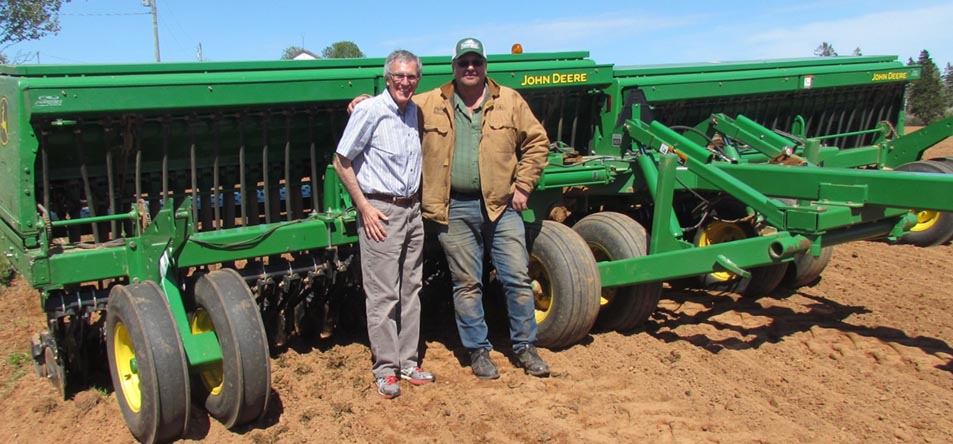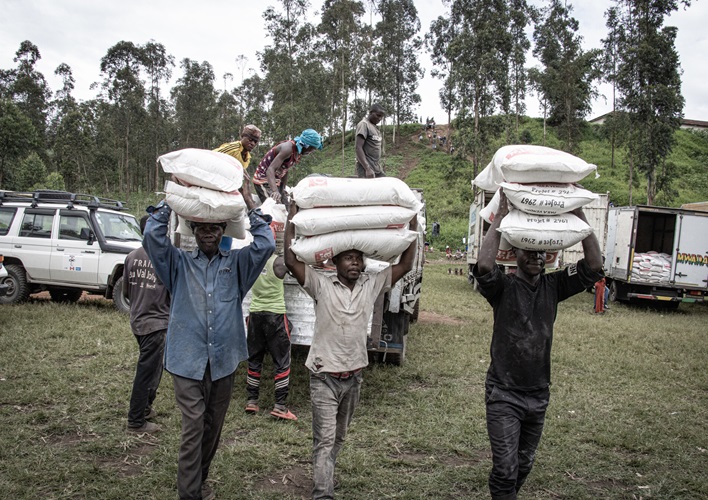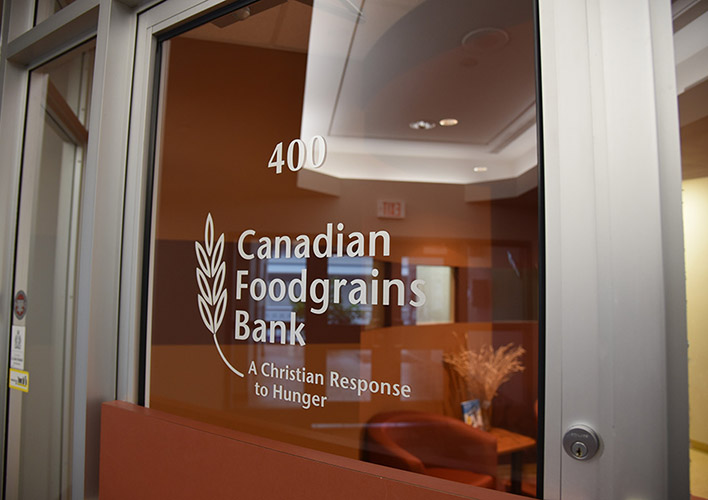On January 24, 2020, Ian MacHattie, Canadian Foodgrains Bank representative for Nova Scotia, was out harvesting a crop of corn. It’s just one example of the challenging season many farmers across the Maritimes this past year. (Photo: Submitted)
Communities overcome challenging weather to help families overseas
It felt like a cold January day because it was a cold January day. In the middle of winter, Ian MacHattie, Canadian Foodgrains Bank representative for Nova Scotia, was out harvesting a crop of corn. It’s just one example of the challenging season many farmers across the Maritimes this past year, including those involved with Foodgrains Bank growing projects.
Weather in Nova Scotia uncooperative
In Nova Scotia, there were five growing projects where farmers and farm supporters came together to tend and harvest a crop to help end global hunger. The Valley Foodgrains Bank project sold blueberries and pumpkins and had another good year. Projects in Masstown, Truro, Brookfield and Milford grew a total of 100 acres of corn and 10 acres of soybeans.
May was so wet that planting didn’t happen until June. Summer was dry, delaying harvest. Then in early September, Hurricane Dorian brought heavy rains and winds that topped 120 kilometres an hour, inflicting widespread damage—flattening crops, damaging fields and blowing fruit from trees.
“After the hurricane, there was a heavy frost that stopped the corn from growing,” says MacHattie. “Crop yields were low, and quality has been poor. These projects will be lucky to just break even.”
Communities overcome the elements in Prince Edward Island
“This was a tough year,” says Douglas Rollwage, Lead Minister at Zion Presbyterian Church in Charlottetown, Prince Edward Island. “Our church has supported three or four growing projects each year since we started doing this 12 years ago. This year we have projects in New Glasgow, Long Creek and Brudenell totaling about 60 acres. Unfortunately, one project couldn’t harvest their soybeans. It’s the first time we’ve ever had a crop failure.”
It starts with small seeds, small hands, and small money. And it turns into thousands of dollars to help people facing hunger.
“It was a pretty terrible year, to be honest,” says Kent Myers, volunteer Foodgrains Bank representative in P.E.I. “But you have to hand it to everyone involved with these growing projects. They stepped up in the face of adversity and most still got their crops off. Churches and other community supporters have increased their donations too, after hearing about the challenging season.”
Each year in New Glasgow, P.E.I., the local 4-H club grows and sells pumpkins to help the Rustico growing project—another supported by Zion Church—succeed. This year, the project was able to donate $6,000 to the Foodgrains Bank.
“It starts with small seeds, small hands, and small money. And it turns into thousands of dollars to help people facing hunger,” says Abe Buttimer who co-leads the growing project.

Ron MacMillan, Missions chair from Zion Presbyterian Church (left) with Abe Buttimer who co-leads the Rustico growing project in New Glasgow, P.E.I. and has been involved since the project started in 2002. (Photo: Submitted)
New Brunswick not immune to challenges
New Brunswick farmers experienced challenges similar to their Maritime counterparts.
“Yields and quality were both down significantly,” says Brian McCullum, Foodgrains Bank representative for New Brunswick. “Most soybeans were only harvested at the end of November, and there is still a lot of corn out on the field.”
Luckily for the apple orchard growing project led by Petitcodiac Mennonite Church, the weather wasn’t a factor in their operation.
“We started by selling apple cider and apple sauce in 2011—mostly at farmers markets but also to people at church,” says Sandra Bunnett who organizes the project. “Three years ago, there were fewer apples, and they were smaller and more sour. Midland Baptist and Millstream United churches had access to a new orchard and now volunteers from those churches pick the apples and send them to Petitcodiac Church for crushing.”
This year, the project sold 434 litres of apple cider, which raised about $1,000 for the Foodgrains Bank.
It’s wonderful to see how different churches and communities can come together to help.
“We may not be the largest project, but we contribute what we can. It’s wonderful to see how different churches and communities can come together to help people who don’t have enough to eat.”
Across the Maritimes this past season, it was a story of perseverance, a story of working together, and a prime example of how Canadians can transform the lives of people and families they have never even met.
– Jason Permanand, Writer




